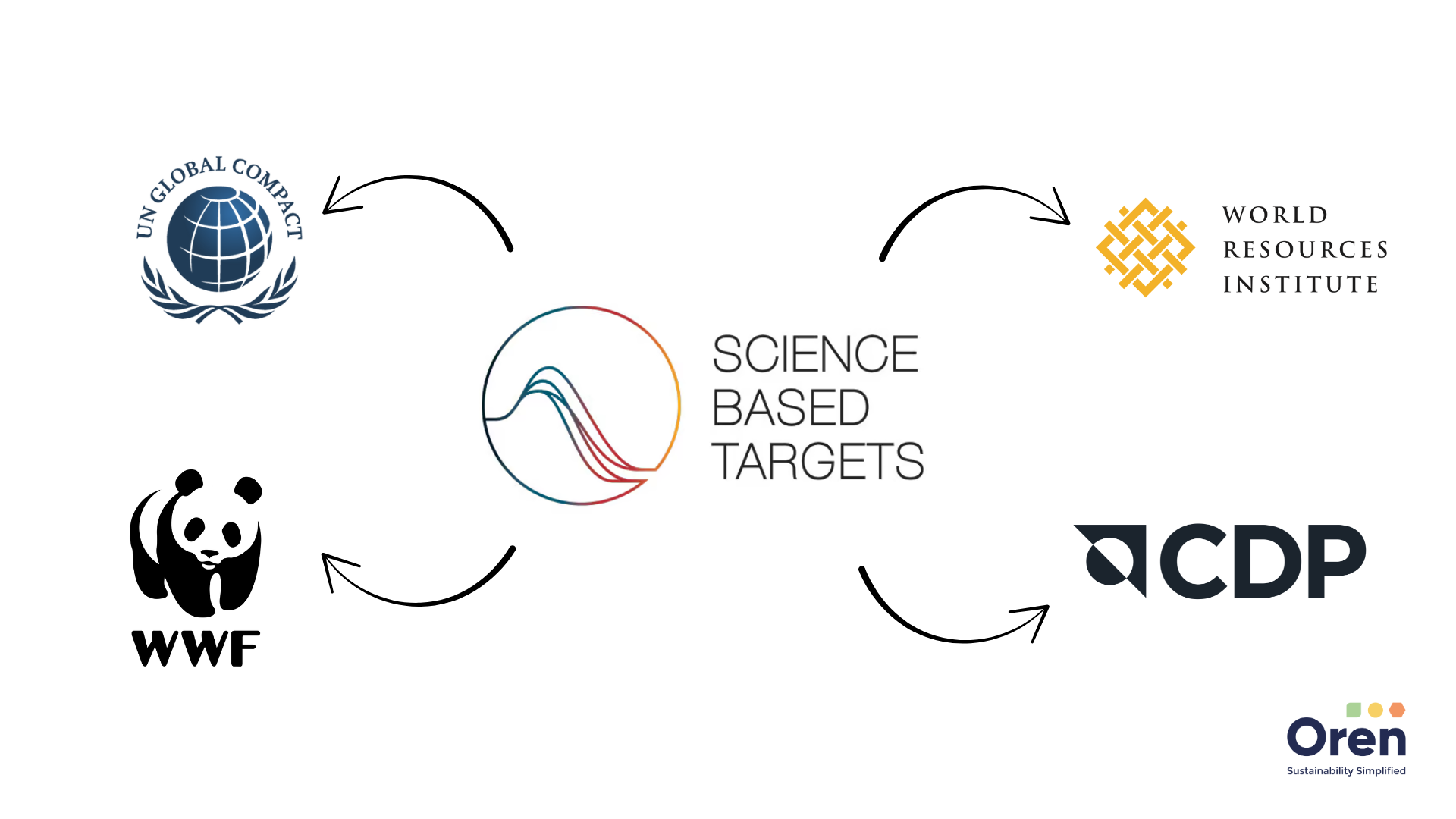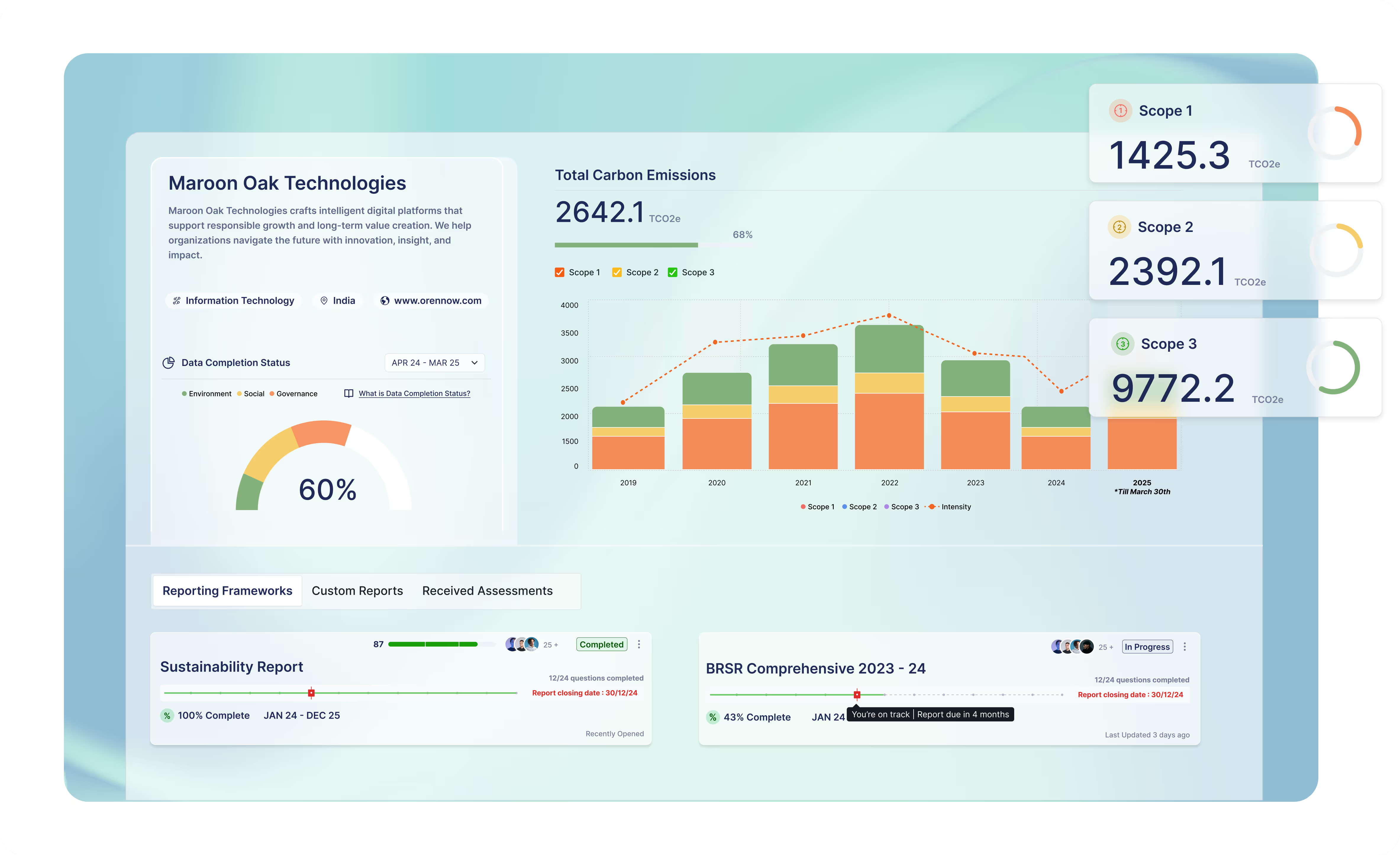Understanding the Science-Based Target Initiative (SBTi)

What is the Science-Based Target Initiative?
The Science Based Targets Initiative (SBTi) is a critical framework founded as a collaboration between the United Nations Global Compact (UNGC), Carbon Disclosure Project (CDP), World Resources Institute (WRI), and the World Wide Fund for Nature (WWF). Established in 2015, its primary goal was to close the climate-action gap between corporate pledges and science-based requirements to limit temperature rise as per the Paris Agreement.
It was designed to guide businesses in reducing their greenhouse gas (GHG) emissions in line with what climate science deems necessary to prevent the most severe impacts of climate change. In 2018, the Intergovernmental Panel on Climate Change (IPCC) issued a warning that global warming must be limited to 1.5 degrees Celsius above pre-industrial levels. For this to become a reality, businesses must play their role in transitioning to a low-carbon economy by setting and achieving science-based targets.
Understanding Science-Based Targets
These are targets that give businesses a clear and measurable way to cut their greenhouse gas emissions. The targets are time-limited goals for cutting emissions that are in line with the most recent climate science. The SBTi gives businesses the tools and help they need to set these goals, making sure that their plans to cut emissions are scientifically sound.
What Constitutes a Science-Based Target & How They Are Science-Based
The SBTi framework sets clear and strict criteria for a science-based target. This criteria is comprehensive, industry-specific, and built on several key principles:
1. Paris Agreement alignment
The target must limit global warming below 2 degrees Celsius and preferably to 1.5 degrees Celsius
2. Scope coverage
The target must comprise Scope 1, Scope 2, and Scope 3 emissions.
3. Time-bound
The near-term targets, ranging from 5 to 10 years, must cover at least 95% of Scope 1 and 2 emissions. Also, it must cover 67% of Scope 3 emissions. Similarly, the long-term targets for the year 2050 or sooner must cover 95% of Scope 1 and 2 emissions and 90% of Scope 3 emissions.
Generic sustainability targets are often broad and self-declared goals that a company sets to show that it cares about the environment. But they might not have outcomes that can be measured or checked by someone else. The Science-Based Targets initiative (SBTi) checks and approves specific, measurable, and time-bound emission reduction goals called validated Science-Based Targets (SBTs).
Key Benefits of the SBTi
Engaging with the SBTi offers companies several key benefits, such as:
1. Credibility
SBTi-approved targets are verified externally. They give businesses a trusted, science-based way to cut emissions.
2. Investor trust
Following SBTi shows investors the company is managing climate risks and taking measurable action.
3. Risk reduction
SBTi helps spot and reduce climate-related risks, like energy costs, supply chain issues, and regulatory challenges.
4. Competitive edge
Adopting SBTi sets companies apart. It attracts eco-conscious customers and boosts brand reputation.
5. Enhances resilience
They help companies proactively adapt to evolving regulations while increasing the financial impacts of climate change. It also lowers the risk of non-compliance with future emissions regulations, thus creating a stable operation environment.
6. Improves compliance
SBTs ensure companies remain compliant with international climate policies. It also helps companies prepare for emerging mandatory Environmental, Social, and Governance (ESG) disclosure regulations. They can cut compliance costs and fines.
7. Creates long-term value
Companies achieve operational efficiencies and lower energy costs. It helps attract investors and increase competitiveness in the market.

How the SBTi Works
SBTi functions in the following manner to make an impact:
1. Register and Commit
Submit a signed Commitment Letter via SBTi’s Validation Services. It should align with SBTi criteria, including a 1.5 degrees Celsius ambition for Scope 1 and 2 and below 2 degrees Celsius for Scope 3.
2. Develop Targets
Measure the Scope 1, 2, and 3 emissions using the GHG protocol and choose the best SBTi-approved method to set your targets. The options to consider include absolute contraction for fixed emissions cuts, economic intensity for emissions per unit revenue, and the Sectoral Decarbonisation Approach (SDA) for an industry-specific path. Apply sector-specific guidance where relevant.
3. Submit for Validation
Upload targets through the SBTi portal with supporting documentation. The thorough review process will take around 6 to 8 weeks.
4. Public Announcement
Share approved targets publicly through SBTi and partners. Align internal communications to ensure organizational awareness.
5. Monitor and Report Progress
Track and report annual emissions and progress against targets to maintain transparency and accountability.
6. Maintain Alignment
Revalidate targets every five years and separately track Scope 1 and 2 reductions. Also, prioritise relevant Scope 3 actions and manage residual emissions responsibly
The Ambitious and Rigorous Standards of SBTi
The Science Based Targets Initiative is recognised as the gold standard for setting corporate carbon reduction goals. It provides strict criteria that companies must meet to ensure their targets are truly science-based. This includes:
1. Evaluation of all sources of emissions
It involves covering Scope 1, Scope 2, and significant Scope 3 emissions to ensure a comprehensive assessment of a company’s footprint.
2. Setting short-term reduction goals
It provides immediate and measurable steps toward short-term and long-term decarbonisation.
3. Avoiding the use of carbon offsets
It ensures that reductions are real and tangible rather than relying on compensation mechanisms.
SBTi uses the latest climate science and rigorous independent validation to approve only targets aligned with pathways limiting warming to the defined temperature criteria. It involves public disclosure of data. Also, the companies must review and revalidate targets every five years to maintain alignment with evolving science.
Currently, nearly 1,000 companies, responsible for over 1 billion metric tonnes of CO2 emissions, have committed to setting SBTs, representing about 2% of global emissions.
What is the Difference Between Net-Zero and SBTi?
Net-Zero and the Science-Based Targets initiative (SBTi) are not the same but rather complementary paths of corporate climate action.
Net-Zero: It refers to reducing greenhouse gas emissions (GHG) to the lowest possible level and then balancing any remaining emissions through permanent removals using carbon credits. It is a destination, end goal, or the point at which an organisation’s activities no longer contribute to the accumulation of GHGs in the atmosphere. Global roadmaps like the Paris Agreement set 2050 or earlier as the timeline for achieving net-zero.
Hence, net-zero is the end goal, balancing emissions with removals. SBTi, on the other hand, is the framework that guides companies with science-based targets. Yet, they complement each other, as SBTi sets the pathway and ensures accountability, while net-zero marks the final stage of achieving climate neutrality.
Who Can Join & Set a Science-Based Target?
The global companies from any sector and any size can set science-based targets. It includes corporate companies, financial institutions, SMEs, and others. The companies from the highest-emitting sectors are highly welcome to contribute to a zero-carbon economy.
General Requirements
The general participation requirements for different companies include:
1. Public commitment
The organisations must commit to establishing emission reduction targets aligned with climate science.
2. Alignment with SBTi standards
Participating companies must develop both near-term and long-term decarbonization goals that meet SBTi criteria.
3. Baseline footprint assessment
Companies must calculate their emissions across Scope 1, Scope 2, and relevant Scope 3 categories to establish a reference point.
4. Annual disclosure
Once approved, companies must publicly report progress against their validated targets annually. It is necessary to maintain transparency and accountability.
For SMEs
The requirements for SMEs are categorised into two parts:
1. Mandatory:
- SMEs must have less than 10,000 tons of carbon dioxide equivalent across Scope 1 and location-based Scope 2 emissions to be categorised as an SME.
2. Meet at least three of the following conditions:
- Should have fewer than 250 employees
- Turnover must be below €50 million
- Total assets should be less than €25 million
- Are not part of a mandatory Forest, Land and Agriculture (FLAG) sector
Businesses in the fossil fuel industry are excluded from setting SBTs due to their incompatibility with 1.5 °C pathways.
Why SBTi is Crucial for Businesses?
Businesses are under pressure to cut down their carbon emissions as sustainability is becoming a global priority. Rather than depending on buying carbon credits, as witnessed in traditional methods, SBTs push businesses actually to lower their emissions. It ensures companies move beyond surface-level ‘green’ claims and take real steps to fight climate change. It helps them protect themselves from future risks and contribute to avoiding the worst impacts of global warming.
Examples of Goals Set by SBTi-Committed Companies
Companies that have set the goals and even achieved the same are as follows:
- YKK has committed to reducing its greenhouse gas emissions (GHG) by 30% by 2030.
- Apple has reduced emissions by over 60%. They have set the goal to become carbon neutral across their global footprint.
- Wipro has committed to net zero emissions by 2040 with a 55% GHG reduction target by 2030. Its near-term targets are validated by SBTi under its Net-Zero Standard in October 2021.
- Jones Lang LaSalle (JLL) has committed to achieving Net-Zero emissions across its value chain by 2040.
- AstraZeneca is among the first seven companies with a validated Net-Zero target from SBTi. It targets significant emissions reductions across all scopes per the SBTi Net-Zero Standard.
How Oren Can Help?
Oren acts as a strategic partner for companies aiming to align with the Science-Based Targets initiative. We provide tailored expertise to help businesses interpret SBTi requirements, build credible emissions inventories, and design practical decarbonization strategies. Our support extends through the full journey, which includes:
- Committing to targets
- Preparing documentation for validation
- Setting up transparent GHG measurement and reporting systems using Oren Sustainability Hub
- Developing decarbonisation roadmaps that align with SBTI’s requirements
- Conducting training to ensure all employees, including the top management and the Board, are aligned with the company’s SBTi target and decarbonisation roadmap
- Identification of key initiatives to achieve the set targets
With strong knowledge about SBTi meaning and its in-depth detail, ESG reporting, and sustainability frameworks, Oren equips organisations with the right tools to embed climate goals into their core strategy. Working with us will help companies gain confidence that their targets are science-aligned, achievable, measurable, and impactful.
Conclusion
The Science Based Targets initiative empowers companies to take climate action with clarity and confidence. Adopting their targets helps businesses align with global efforts to limit global warming. Additionally, it opens opportunities for innovation, efficiency, and long-term growth. SBTi provides the credibility and accountability needed to make climate strategies impactful.
Companies benefit from knowing SBTi meaning and its implementation as it strengthens stakeholder trust, improves competitiveness, and drives measurable progress toward net zero. Organizations can safeguard their future by committing to SBTi and even expect to become leaders in building a resilient and sustainable economy.
Frequently Asked Questions
Has the SBTi Been Successful So Far?
SBTi has driven exponential growth in just eight years. Hundreds of companies join SBTi monthly to set science-based targets. The momentum shows corporate trust and global influence.
Does Committing to the SBTi Deliver Positive Results for Companies?
Yes, it does. Companies that understand what is science-based target initiative can enhance brand reputation and attract investors. They improve operational efficiency and enhance resource management. It also offers a competitive advantage to the companies and strengthens their credibility across major sustainability platforms.
How Do Science-Based Targets Differ from Traditional Emission Goals?
Traditional emission goals are company-defined and based on feasibility, and hence, are ignorant of climate science. Science-based targets follow a top-down approach using a global carbon budget. They set ambitious and measurable reductions aligned with the Paris Agreement.
What Are the Different Scopes Covered Under Science Based Targets?
Science based targets cover Scope 1, Scope 2, and Scope 3 emissions as per the Greenhouse Gas Protocol.
What Does SBTi Mean in the Context of Sustainability?
The Science Based Targets initiative (SBTi) guides companies to set emissions reductions aligned with climate science. It provides clear frameworks, validation, and accountability. Businesses integrate sustainability into operations, drive measurable decarbonization, and contribute to global efforts to limit warming by following SBTi.
What Are the IPCC’s Science Based Targets?
IPCC provides a scientific foundation for climate action. It outlines emission reductions needed to limit warming to 1.5 degrees Celsius. Science Based Targets translate this science into actionable goals for companies. It guides them to reduce GHG emissions by 45% by 2030 and achieve Net-Zero by 2050.
Latest Blog Posts
Dive into our blog for insights on making your organization more sustainable.
Sustainability Simplified
Wherever you are in your sustainability journey, we help you advance with confidence.
Schedule a Call



.avif)

